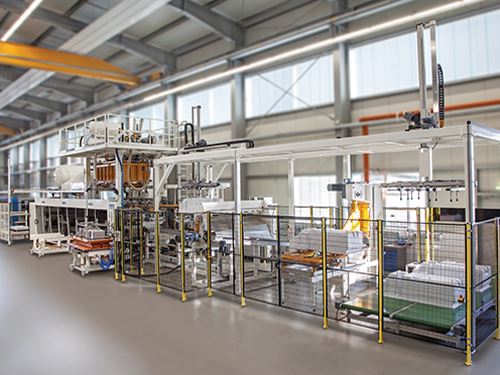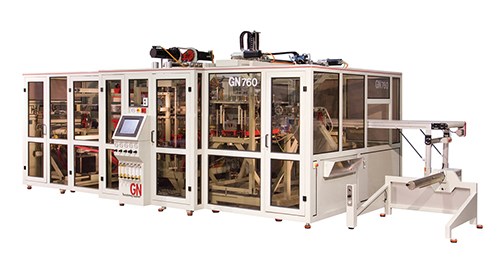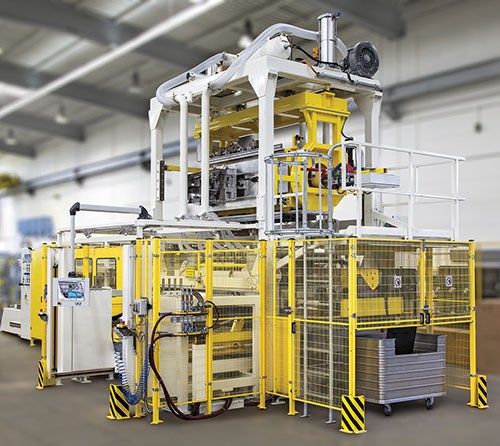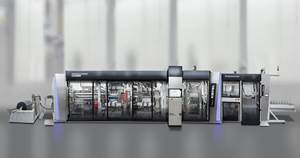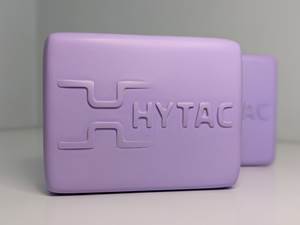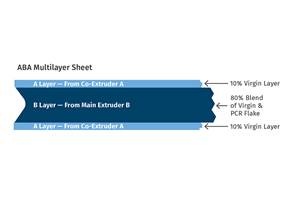K 2013 Preview: Thermoforming
Speed, versatility, control, and cost savings are keys to new thermoforming machines for packaging and industrial applications
Speed, versatility, control, and cost savings are keys to new thermoforming machines for packaging and industrial applications that will debut next month at K 2013.
FASTER CYCLES, MORE CONTROL
Germany’s Kiefel (U.S. office in Portsmouth, N.H.) will show two forming machines that are said to significantly increase productivity because of a new stacking station. The new stacking system, dubbed “Best,” stacks cups vertically, facilitating subsequent sleeving and packaging steps, Kiefel says. At the show, the firm will be producing PP cups with the new stacking station and the KTR 5 “Speed” thermoformer. Kiefel says this combination permits PP cups to run at cycles comparable to PET.
The new stacking system will also be shown with Kiefel’s KMD 78 “Speed” pressure former, making PP trays in a 16-up tool. Kiefel states that both packaging machines can run PET, PP, and bioplastics such as PLA.
Illig of Heilbronn, Germany, will show automatic roll-fed machines equipped with its Intelligent Control Concept (IC) for improved process stability and product quality. The new control technology includes modules for optimizing all aspects of the process, from simplification of machine operation and quicker tool changes to enhanced process control. IC is designed for new-generation formers with all-electric servo drives.
Illig’s ThermoLineControl module can be used by operators to call up and program all components of the production line centrally at the forming station. Various support functions are available for process optimization and reduction of tool-change times.
At the show, Illig will run the RDKP and RDMK series automatic roll-fed machines equipped with IC technology. APET cups will be produced on an IC-RDM 54K machine, with a forming area of 520 x 300 mm. The machine will run an 18-up tool, allowing production rates of more than 50,000 cups/hr. Hinged PP trays will be made on an IC-RDKP 72 machine with a maximum forming area of 756 x 535 mm, on a 6-up tool.
Gabler Thermoform GmbH & Co. KG, Luebeck, Germany will show an optimized version of its established M98 tilt machine, producing PP water cups with a sealing rim and a diameter of 73.5 mm on a 60-cavity tool.
On the M98, the forming step has been optimized with advanced plug-assist technology and forming-air supply. These features, along with high-performance motors in the forming station, are said to considerably increase capacity.
Newly developed “reverse stacker” technology was designed by Gabler with safety in mind. Thin-wall and other products that are difficult to stack are gingerly removed from the tool and stacked. The stacker requires nothing in the way of fixing components that could potentially damage the product. A sensor system has been integrated into the line to constantly monitor the machine and its peripheral devices. A real-time process monitoring system offers operators a clearly arranged navigation and sophisticated diagnostic features.
GN Thermoforming Equipment, Chester, Nova Scotia, will showcase its second-generation GN760 plug-assist thermoformer along with unique common-edge tooling technology. The company will also demonstrate its new high-speed robotic stacker for its contact-heat, in-mold-cut thermoformers.
The GN760 cut-in-place machine will run a 10-up common-edge die tool for PET meat trays to demonstrate the machine’s low-scrap capability. Innovative tooling developed by GN is said to significantly reduce skeletal web scrap from approximately 30% to 18% compared with typical form-cut-stack machines.
The second-generation GN760 features an automatic sheet-tensioning system that allows the chain rails to minimize sag during heating. Other key enhancements include a special feedback system that performs energy monitoring, and a unique tool-removal system. The machine has a 762 x 533 mm (30 x 21 in.) forming area.
The machine also offers a 35% to 50% reduction in electrical consumption compared with competing equipment. The new model uses servo drives for plug assist, material transport, stripping, and stacking. It also boasts a radiant infrared heating system with 60 zones and an electronic regeneration system that reduces energy use, resulting in a savings of approximately $9000/yr.
A unique feature of the GN760 is a plug drive system with twin servo motors and a rotary-driven toggle. The drive is more compact, reducing the height of the machine, and also delivers better control of the plug. The machine handles sheet widths up to 32 in. (812 mm). It can run sheet from 0.25 mm to 1.5 mm thick. The unit handles PET, HIPS, PLA, PP, and PVC.
GN’s new RSX robotic stacker is said to offer greater stacking flexibility and faster cycles. This high-speed unit was developed in response to customer demand and was designed, in fact, with customer input. The new unit stacks at a faster rate than the previous model and provides A/B and A/B/C stacking capabilities. The rotating head turns products 180° for denesting and can stack any configuration that the thermoformer delivers, the company says.
Another important feature is that the x/y axis is positioned in the center of the sheet line, unlike the previous system which had it positioned to the right. This results in more robust handling and transfer of parts at high speeds. The RSX robotic stacker is commercially available and the first units have been shipped to several customers in the U.K.
LOWER ENGERY, HIGHER RATES
Kiefel will also display a new thermoformer for refrigerator door liners. Called the KID 80/200 BFS-R, the machine is said to provide significant reductions in material and energy costs at production rates up to 40% faster than competing machines. The machine can process 1.3-mm-thick HIPS in a cycle time less than 12 sec. Cutting takes place in the forming station with an integrated trim-in-place tool.
For automotive applications, Kiefel reported that is has delivered seven laminating machines used to make the door interior trim of the new BMW 3 Series. Each of these machines takes just 80 sec to produce a complete set of door interior-trim components.
Kiefel adds that Mercedes Benz, in cooperation with its Tier 1 supplier, Johnson Controls Inc., also recently started using Kiefel thermoformers for interior-trim components. The car manufacturer recently ordered six laminating units to produce the door interior trim for the new C-Class. All of these machines have been equipped with an in-mold-graining tool developed by Kiefel, which provides a particularly smoothly grained surface.
Mercedes will soon be producing 2200 vehicles/day of the C-Class.
Geiss of Germany (geiss-ttt.com; U.S. office in Durham, Ct..) will display its T Series of deep-draw, heavy-duty machines and the more compact U Series. The machine table of the U Series is pneumatically lifted from below to provide a draw depth of 300 mm. A platform or pit is not required.
Geiss will also show new trimmers with three main axes and a welded machine box with stationary machine table. A trimming spindle suspended in a rotatable gimbal head is fitted to the vertical Z axis of the machine.
The axes are driven by three-phase Siemens servomotors that are said to be maintenance-free and to produce maximum torque even from zero speed, with high overload capacity.
The rail guides are compact and distinguished by their rigidity and high load capacity in all directions. The ball races are hardened and completely sealed to protect them from dirt.
Related Content
Sustainable Materials is Focus of Thermoforming Exhibits at K 2022
Thermoforming equipment makers including WM, Kiefel, and OMV will showcase processing of recyclable and biobased materials.
Read MoreHigh-Temperature Syntactic Foam and High-Slip Plug Materials for Thermoforming
At K 2022, CMT Materials to launch new Hytac syntactic foam and a developmental higher slip plug materials with no PTFE.
Read MoreOMV Technologies Gets New CEO
Kooper brings 33 years of experience in the industrial and consumer packaging industries to OMV--the closed-loop, turnkey, inline extrusion, thermoforming and tooling systems manufacturer.
Read MoreThermoforming PCR: An Equipment Supplier’s Pointers
Thermoforming PCR is not radically different from forming virgin, but variation in recycled materials can require extra care to get a consistent end result. Start by examining every aspect of the process from the sheet (and extrusion process if run inline) to the final trim.
Read MoreRead Next
Advanced Recycling: Beyond Pyrolysis
Consumer-product brand owners increasingly see advanced chemical recycling as a necessary complement to mechanical recycling if they are to meet ambitious goals for a circular economy in the next decade. Dozens of technology providers are developing new technologies to overcome the limitations of existing pyrolysis methods and to commercialize various alternative approaches to chemical recycling of plastics.
Read MoreHow Polymer Melts in Single-Screw Extruders
Understanding how polymer melts in a single-screw extruder could help you optimize your screw design to eliminate defect-causing solid polymer fragments.
Read More

